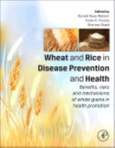Wheat and Rice in Disease Prevention and Health reviews the wide range of studies focusing on the health benefits and disease prevention associated with the consumption of wheat and rice, the two most widely consumed whole grains. This book provides researchers, clinicians, and students with a comprehensive, definitive, and up-to-date compendium on the diverse basic and translational aspects of whole grain consumption and its protective effects across human health and disease. It serves as both a resource for current researchers as well as a guide to assist those in related disciplines to enter the realm of whole grain and nutrition research.
Overall, studies have shown that a decrease in the amount of whole grains in the modern diet is related to a corresponding increase in health problems that are attributed to this all-too-common dietary imbalance. The resulting health issues associated with an over-processed diet, which provides inadequate levels of nutrients from whole grains, may include obesity, diabetes, high blood lipids, chronic inflammatory states, and an excess of oxidative stress. Strength and endurance may also suffer as a result of these nutrient deficiencies, followed by declines in energy and immunity.
Please Note: This is an On Demand product, delivery may take up to 11 working days after payment has been received.
Table of Contents
PART I: WHEAT AND HEALTH
Section A: Wheat Components in Disease Prevention: Overview
1 Whole Wheat Pasta and Health
2 Whole Grain and Phytate-Degrading Human Bifidobacteria
Section B: Wheat in Commercial Animal Production
3 Effect of Whole Wheat Feeding on Gut Function and Nutrient Utilization in Poultry
4 Whole Wheat in Commercial Poultry Production
Section C: Wheat in Diabetes and Heart Disease Prevention
5 Wheat Fiber in Postprandial Metabolic Profile and Health
6 Bioavailability of Calcium, Iron, and Zinc in Whole Wheat Flour
7 Nutritive and Digestive Effects of Starch and Fiber in Whole Wheat
Section D: Wheat in Cancer Prevention
8 Colorectal Cancer Prevention by Wheat Consumption: A Three-Valued Logic True, False, Or Otherwise?
9 Whole Grain and Dietary Fiber Intake and Risk of Prostate Cancer
10 Bioactive Phytochemicals in Wheat Bran for Colon Cancer Prevention
Section E: Gluten and Disease
11 Immunologic Reactions to Wheat: Celiac Disease, Wheat Allergy and Gluten Sensitivity
12 Celiac Disease and its Therapy: Current Approaches and New Advances
13 Gluten Metabolism in Humans: Involvement of the Gut Microbiota
14 Adverse Reactions to Gluten: Exploitation of Sourdough Fermentation
Section F: Wheat Fiber
15 Antioxidant Properties of Wheat Bran against Oxidative Stress
16 Wheat and Rice Dietary Fiber in Colorectal Cancer Prevention and the Maintenance of Health
17 Sensory, Technological, and Health Aspects of Adding Fiber to Wheat-Based Pasta
18 Dietary Fiber and Wheat Bran in Childhood Constipation and Health
19 Wheat Bran and Cadmium in Human Health
Section G: Wheat Toxicity
20 Wheat Contaminants (Pesticides) and their Dissipation during Processing
PART II: RICE AND OTHER WHOLE GRAINS IN HEALTH
Section A: Overview of Rice and Health
A1 Nutrients and Rice Consumption
21 Genetically Modified Rice with Health Benefits as a Means to Reduce Micronutrient Malnutrition: Global Status, Consumer Preferences, and Potential Health Impacts of Rice Biofortification
22 Rice Bran: A Food Ingredient with Global Public Health Opportunities
23 Rice Bran Oil: Benefits to Health and Applications in Pharmaceutical Formulations
24 Rice Intake, Weight Change and Metabolic Syndrome
A2 Rice in Diabetes Prevention and Treatment
25 Glycemic Index of Indian Cereal Staple Foods and their Relationship to Diabetes and Metabolic Syndrome
26 Rice and Type 2 Diabetes
27 Rice and the Glycemic Index
A3 Rice Toxicity and Toxic Contaminants
28 Arsenic in Rice: Sources and Human Health Risk
29 Arsenic in Rice-Based Infant Foods
30 Inorganic Arsenic in Rice and Rice Bran: Health Implications
A4 Rice Fiber
31 Apoptosis and Arabinoxylan Rice Bran
32 ?-Oryzanol: An Attractive Bioactive Component from Rice Bran
33 Evaluation of Physical and Nutritional Properties of Extruded Products Based on Brown Rice and Wild Legume Mixtures
34 Rice Bran Antioxidants in Health and Wellness
35 Organic Rice Bran Oils in Health
36 Fermented Rice Bran Attenuates Oxidative Stress
37 Rice Bran Oil's Role in Health and Cooking
Section B: Novel Approaches to Bran and Whole Grains
38 Amino Acid Production from Rice Straw Hydrolyzates
39 Germinated Barley Foodstuff Dampens Inflammatory Bowel Disease
40 Development of Functional Foods (Enzyme-Treated Rice Fiber) from Rice By-products
41 Chickpea (Cicer arietinum L.) Fortification of Cereal-Based Foods to Increase Fiber and Phytochemical Content








